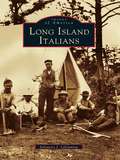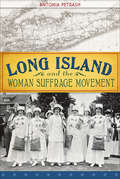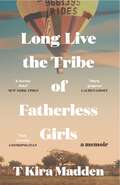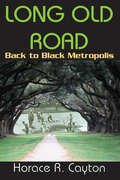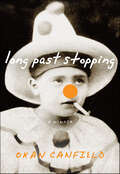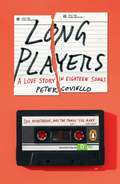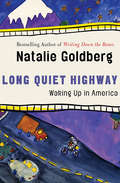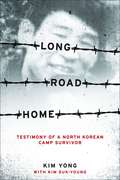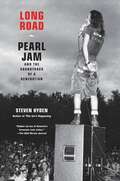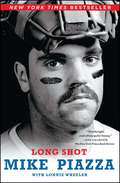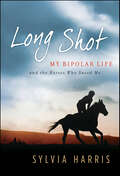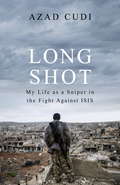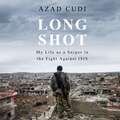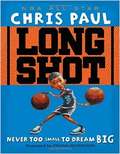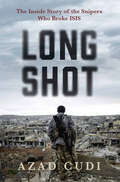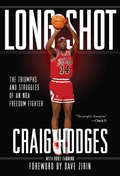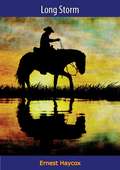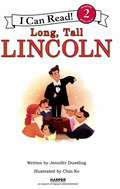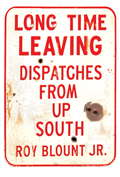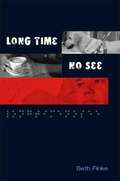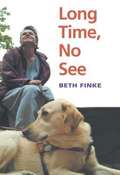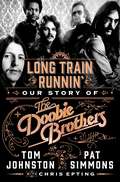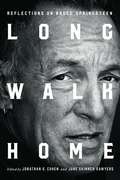- Table View
- List View
Long Haul: Lessons from public life
by John BrumbyThe Long Haul distils a series of practical lessons on leadership and public life from John Brumby's thirty years in politics. It offers insights into the challenges and opportunities Australia currently faces and argues for real political reform, a different future for our federation and strong leadership in a world in transition.
Long Island Italians (Images of America)
by Salvatore J. LaguminaIn America "the streets were paved with gold." That was the mistaken notion of many an immigrant to the United States in the late 1800s and early 1900s. On Long Island, deluded sojourners from Italy were to find that in fact there were few streets and that they themselves were to be the ones to build them.Covering more than a century of history, Long Island Italians depicts the transition of urban Italians as they moved increasingly from the city to the suburbs in Nassau and Suffolk Counties. They were attracted to Long Island by economic opportunity, the availability of arable land, home ownership possibilities, and alternatives to harsh city life. There, they became the largest of all ethnic groups, with more Americans of Italian descent living in one concentrated area than anywhere besides Italy. The Italian American presence is a continuing phenomenon, today comprising about 25 percent of the total population of Long Island. Long Island Italians graphically illustrates that Italian laborwas vital to the development of Long Island roads, agriculture, railroads, and industry. By the early twentieth century, Italians made up the bulk of the work force. The book goes beyond the laborers to show also the warmth of Italian family life, the strength of the social organizations, and the rise of the politicians.
Long Island and the Woman Suffrage Movement
by Antonia PetrashAn account of how the women’s rights movement found fertile ground on Long Island and succeeded thanks to the suffragettes’ classic grassroots campaign. For seventy-two years, American women fought for the right to vote, and many remarkable ladies on Long Island worked tirelessly during this important civil rights movement. The colorful—and exceedingly wealthy—Alva Vanderbilt Belmont was undoubtedly the island’s most outspoken and controversial advocate for woman suffrage. Ida Bunce Sammis, vigorous in her efforts, became one of the first women elected to the New York legislature. Well-known Harriot Stanton Blatch, daughter of Elizabeth Cady Stanton, worked with countless other famous and ordinary Long Islanders to make her mother’s quest a reality. Author Antonia Petrash tells the story of these and other women’s struggle to secure the right to vote for themselves, their daughters and future generations of Long Island women.
Long Live the Tribe of Fatherless Girls
by T Kira Madden'Utterly gorgeous' Lauren Groff, author of Fates and Furies'Sad, funny, juicy and prickly with deep and secret thoughtful places' Mary Gaitskill, author of This is Pleasure_____As a child, Madden lived a life of extravagance, from her exclusive private school to her equestrian trophies and designer shoe-brand name. But under the surface was a wild instability. The only child of parents continually battling drug and alcohol addictions, Madden confronted her environment alone. Facing a culture of assault and objectification, she found lifelines in the desperately loving friendships of fatherless girls. With unflinching honesty and lyrical prose, spanning from 1960s Hawai'i to the present-day struggle of a young woman mourning the loss of a father while unearthing truths that reframe her reality, Long Live the Tribe of Fatherless Girls is equal parts eulogy and love letter. It's a story about trauma and forgiveness, about families of blood and affinity, both lost and found, unmade and rebuilt, crooked and beautiful.
Long Live: The Definitive Guide to the Folklore and Fandom of Taylor Swift
by Nicole PomaricoThis lushly illustrated package is the ultimate fan guide for Swifties! It covers the Taylor Swift multiverse from all angles with a journey through fandom history, exclusive interviews, and behind-the-scenes detail on her career across eras, including The Tortured Poets Department. Whether you&’ve been with Taylor from the start or are a new fan, this guide is for you. Use it to catch up on all the lore and inside jokes from the beginning, or to discover forgotten details from the past. From MySpace comments to T-Party invites to Secret Sessions and beyond, Long Live explores the evolution of Taylor as well as the ride that fans have been on with her through two decades of personal milestones—hers and ours, both good and bad. With Long Live you&’ll: Take a trip through Taylor&’s eras from the start of her career, with stops at each album and its iconic songs, the hidden Easter Eggs, and relationships that have informed the star&’s music. Have fun looking back on concert traditions and inside jokes, roll your eyes at the most embarrassing clowning moments, take in era-specific Swiftie style lessons, read exclusive stories of fan encounters and author Nicole Pomarico&’s own experiences meeting Taylor Swift and her parents. Be amazed by how the relationship between Taylor and her fans has been so well nurtured that it has become a cultural force building the career of one of the biggest stars of all time. Featuring stylish illustrations and photos throughout, this is an essential look at the artist&’s career and fandom. The complete package for Taylor Swift fans!
Long Old Road: Back to Black Metropolis
by Horace CaytonFrom the time that he ran away to sea at sixteen, until he graduated from the University of Washington, Horace R. Cayton was a messman on a freighter, an unknowing handyman in an Alaskan brothel, a juvenile delinquent and inmate of a reform school, a dock worker and steward on a passenger liner, and a deputy in the sheriff's office of King County, Washington. Born in Seattle, a city then uniquely free from racial tensions and prejudices, Cayton found the privileged, secure, middle-class position of his well-to-do parents ineffectual against the gradual spread of racism that was sweeping America. His disarmingly honest autobiography is the ever-absorbing record of an intelligent, sensitive, and proud man's attempts to find identity in a confusing and conflicting chaos of black and white, in a nation that, although dedicated to equality, somehow managed to deny this ideal by almost every action. Although his turbulent life was complicated by the color barrier--often resulting in reverses and frustrations that have rendered him close to a breakdown--this alone is not what makes Cayton's book such captivating reading. Wholly lacking in self-pity or special pleading, Horace Cayton has written a personal narrative of unfailing interest on any number of scores, a book that ranks with the best of American autobiographical writing. For it manages to remain highly critical without once resorting to bitterness; to be filled with hope, though not always hopeful; and brims with compassion and bemused and acute insights into a troubled society. It is a telling, almost poetic tribute to the resiliency of black culture.
Long Past Stopping: A Memoir
by Oran CanfieldOran Canfield—son of self-help guru and Chicken Soup for the Soul creator Jack Canfield—tells his surreal story of growing up in Long Past Stopping. In this remarkable memoir, writing with a wry and cutting edge, Canfield relates tales of a childhood in flux—being buffeted about among family friends, relatives, rebels, and born-again circus clowns, in an anarchist private school, communes, and libertarian enclaves—and of a young adulthood spent among the ruins of heroin addiction. Long Past Stopping is Oran Canfield’s often hilariously harrowing tale of surviving life in the strange lane.
Long Players: A Love Story in Eighteen Songs
by Peter Coviello“A beautiful book. Deeply personal and yet entirely universal. . . A travelogue through the landscape of a broken heart.” —Elizabeth Gilbert, bestselling author of Eat Pray Love A passionate, heartfelt story about the many ways we fall in love: with books, bands and records, friends and lovers, and the families we make. Have you ever fallen in love—exalting, wracking, hilarious love—with a song? Long Players is a book about that everyday kind of besottedness—and, also, about those other, more entangling sorts of love that songs can propel us into. We follow Peter Coviello through his happy marriage, his blindsiding divorce, and his fumbling post marital forays into sex and romance. Above all we travel with him as he calibrates, mix by mix and song by song, his place in the lives of two little girls, his suddenly ex-stepdaughters. In his grief, he considers what keeps us alive (sex, talk, dancing) and the limitless grace of pop songs.
Long Quiet Highway: Waking Up in America
by Natalie GoldbergThe author of Writing Down the Bones shares her story of self-discovery through Zen Buddhism, in &“beautiful and simple prose&” (Library Journal). In this autobiographical work, Natalie Goldberg takes us on a journey from her suburban childhood to her maturation as a writer. From the high-school classroom where she first listened to the rain, to her fifteen years as a student of Zen Buddhism, Natalie Goldberg&’s path is by turns illuminating, disciplined, heartbreaking, hilarious, and healing. Along the way she reflects on her life and work in prose that is both elegant and precise, reminding the reader of what it means to be fully alive. This ebook features an illustrated biography of Natalie Goldberg, including rare photos and never-before-seen documents from the author&’s personal collection.
Long Road Home: Testimony of a North Korean Camp Survivor
by Yong KimKim Yong shares his harrowing account of life in a labor camp-a singularly despairing form of torture carried out by the secret state. Although it is known that gulags exist in North Korea, little information is available about their organization and conduct, for prisoners rarely escape both incarceration and the country alive. Long Road Home shares the remarkable story of one such survivor, a former military official who spent six years in a gulag and experienced firsthand the brutality of an unconscionable regime. As a lieutenant colonel in the North Korean army, Kim Yong enjoyed unprecedented privilege in a society that closely monitored its citizens. He owned an imported car and drove it freely throughout the country. He also encountered corruption at all levels, whether among party officials or Japanese trade partners, and took note of the illicit benefits that were awarded to some and cruelly denied to others. When accusations of treason stripped Kim Yong of his position, the loose distinction between those who prosper and those who suffer under Kim Jong-il became painfully clear. Kim Yong was thrown into a world of violence and terror, condemned to camp No. 14 in Hamkyeong province, North Korea's most notorious labor camp. As he worked a constant shift 2,400 feet underground, daylight became Kim's new luxury; as the months wore on, he became intimately acquainted with political prisoners, subhuman camp guards, and an apocalyptic famine that killed millions. After years of meticulous planning, and with the help of old friends, Kim escaped and came to the United States via China, Mongolia, and South Korea. Presented here for the first time in its entirety, his story not only testifies to the atrocities being committed behind North Korea's wall of silence but also illuminates the daily struggle to maintain dignity and integrity in the face of unbelievable hardship. Like the work of Solzhenitsyn, this rare portrait tells a story of resilience as it reveals the dark forms of oppression, torture, and ideological terror at work in our world today.
Long Road: Pearl Jam and the Soundtrack of a Generation
by Steven HydenA leading music journalist&’s riveting chronicle of how beloved band Pearl Jam shaped the times, and how their legacy and longevity have transcended generations. Ever since Pearl Jam first blasted onto the Seattle grunge scene three decades ago with their debut album, Ten, they have sold 85M+ albums, performed for hundreds of thousands of fans around the world, and have even been inducted into the Rock and Roll Hall of Fame. In Long Road: Pearl Jam and the Soundtrack Of A Generation, music critic and journalist Steven Hyden celebrates the life, career, and music of this legendary group, widely considered to be one of the greatest American rock bands of all time. Long Road is structured like a mix tape, using 18 different Pearl Jam classics as starting points for telling a mix of personal and universal stories. Each chapter tells the tale of this great band — how they got to where they are, what drove them to greatness, and why it matters now. Much like the generation it emerged from, Pearl Jam is a mass of contradictions. They were an enormously successful mainstream rock band who felt deeply uncomfortable with the pursuit of capitalistic spoils. They were progressive activists who spoke in favor of abortion rights and against the Ticketmaster monopoly, and yet they epitomized the sound of traditional, male-dominated rock &‘n&’ roll. They were looked at as spokesmen for their generation, even though they ultimately projected profound confusion and alienation. They triumphed, and failed, in equal doses — the quintessential Gen-X tale. Impressive as their stats, accolades, and longevity may be, Hyden also argues that Pearl Jam&’s most definitive accomplishment lies in the impact their music had on Generation X as a whole. Pearl Jam&’s music helped an entire generation of listeners connect with the glory of bygone rock mythology, and made it relevant during a period in which tremendous American economic prosperity belied a darkness at the heart of American youth. More than just a chronicle of the band&’s career, this book is also a story about Gen- X itself, who like Pearl Jam came from angsty, outspoken roots and then evolved into an establishment institution, without ever fully shaking off their uncertain, outsider past. For so many Gen-Xers growing up at the time, Pearl Jam&’s music was a beacon that offered both solace and guidance. They taught an entire generation how to grow up without losing the purest and most essential parts of themselves. Written with his celebrated blend of personal memoir, criticism, and journalism, Hyden explores Pearl Jam&’s path from Ten to now. It's a chance for new fans and old fans alike to geek out over Pearl Jam minutia—the B-sides, the beloved deep cuts, the concert bootlegs—and explore the multitude of reasons why Pearl Jam&’s music resonated with so many people. As Hyden explains, &“Most songs pass through our lives and are swiftly forgotten. But Pearl Jam is forever.&”
Long Shot
by Lonnie Wheeler Mike PiazzaMike Piazza was selected by the Los Angeles Dodgers in the 62nd round of the 1988 baseball draft as a "courtesy pick." The Dodgers never expected him to play for them--or anyone else. Mike had other ideas. Overcoming his detractors, he became the National League rookie of the year in 1993, broke the record for season batting average by a catcher, holds the record for career home runs at his position, and was selected as an All Star twelve times. Mike was groomed for baseball success by his ambitious, self-made father in Pennsylvania, a classic father-son American-dream story. With the Dodgers, Piazza established himself as baseball's premier offensive catcher; but the team never seemed willing to recognize him as the franchise player he was. He joined the Mets and led them to the memorable 2000 World Series with their cross-town rivals, the Yankees. Mike tells the story behind his dramatic confrontation with Roger Clemens in that series. He addresses the steroid controversy that hovered around him and Major League Baseball during his time and provides valuable perspective on the subject. Mike also addresses the rumors of being gay and describes the thrill of his game-winning home run on September 21, 2001, the first baseball game played in New York after the 9/11 tragedy. Along the way, he tells terrific stories about teammates and rivals that baseball fans will devour. Long Shot is written with insight, candor, humor, and charm. It's surprising and inspiring, one of the great sports autobiographies.
Long Shot: My Bipolar Life and the Horses Who Saved Me
by Sylvia HarrisCombine Seabiscuit with Manic—throw in a touch of HBO’s “Temple Grandin”—and you get Long Shot, a truly remarkable memoir by Sylvia Harris. A single mother of three, Harris was crippled by bipolar depression, until she discovered the miraculous healing and calming effect of horses—a revelation that ultimately enabled her to manage her illness, conquer the sexism of her field, and triumph as a champion jockey in the male-dominated world of horse racing. A fascinating, courageous, and ultimately redemptive true story, Long Shot has won high praise from Phyllis Chesler Ph.D., author of Women and Madness, who says, “[Harris’s] attempt to find balance, joy, connectedness, and purpose in life constitutes a great adventure story.”
Long Shot: My Life As a Sniper in the Fight Against ISIS
by Azad CudiIn September 2014, Azad Cudi became one of seventeen snipers deployed when ISIS, trying to shatter the Kurds in a decisive battle, besieged the northern city of Kobani. In LONG SHOT, he tells the inside story of how a group of activists and idealists withstood a ferocious assault and, street by street, house by house, took back their land in a victory that was to prove the turning point in the war against ISIS. By turns devastating, inspiring and lyrical, this is a unique account of modern war and of the incalculable price of victory as a few thousand men and women achieved the impossible and kept their dream of freedom alive.
Long Shot: My Life As a Sniper in the Fight Against ISIS
by Azad CudiIn September 2014, Azad Cudi became one of seventeen snipers deployed when ISIS, trying to shatter the Kurds in a decisive battle, besieged the northern city of Kobani. In LONG SHOT, he tells the inside story of how a group of activists and idealists withstood a ferocious assault and, street by street, house by house, took back their land in a victory that was to prove the turning point in the war against ISIS. By turns devastating, inspiring and lyrical, this is a unique account of modern war and of the incalculable price of victory as a few thousand men and women achieved the impossible and kept their dream of freedom alive.
Long Shot: Never Too Small to Dream Big
by Chris PaulNBA star Chris Paul tells of being one of the shortest 8-year-olds trying out for the team, and how he didn't let that adversity stop him.
Long Shot: The Inside Story of the Snipers Who Broke ISIS
by Azad CudiA Kurdish journalist who volunteered as a sniper in the fight against ISIS reveals his story in a “gripping memoir . . . elegantly told” (Publishers Weekly).In 2002, at age nineteen, Azad was conscripted into Iran’s army and forced to fight his own people. Refusing to go to war against his fellow Kurds, he deserted and smuggled himself to the United Kingdom, where he was granted asylum, became a citizen, and learned English. But in 2014, having returned to the Middle East as a social worker in the wake of the Syrian civil war, Azad found he would have to pick up a weapon once again.After twenty-one days of intensive training as a sniper, Azad became one of seventeen volunteer marksmen deployed by the Kurdish army when ISIS besieged the city of Kobani in Rojava, the newly autonomous region of the Kurds. Here, he tells the inside story of the Kurdish forces’ bloody street battles against the Islamic State. Vastly outnumbered, the Kurds would have to kill the jihadis one by one, and Azad takes us on a harrowing journey to reveal the sniper unit’s essential role in ISIS’s eventual defeat. Weaving the brutal events of war with personal and political reflection, he meditates on the incalculable price of victory—the permanent effects of war on the body and mind; the devastating death of six of his closest comrades; the loss of hundreds of volunteers in battle. But as Azad explains, these sacrifices saved not only a city but a people and their land.“A propulsive memoir that captures the grim reality of small-scale conflict and reveals the fragmented politics of the Middle East today” (Kirkus Reviews), Long Shot tells how, against all odds, a few thousand men and women achieved the impossible and kept their dream of freedom alive.
Long Shot: The Triumphs and Struggles of an NBA Freedom Fighter
by Rory Fanning Craig HodgesIn this memoir, the Chicago Bulls basketball star details his life on the court as an athlete and off the court as an activist.As a member of the 1992 world-champion Chicago Bulls, a dashiki-clad Hodges delivered a handwritten letter to President George H. W. Bush demanding that he do more to address racism and economic inequality. Hodges was also a vocal union activist, initiated a boycott against Nike, and spoke out forcefully against police brutality in the wake of the Rodney King beating.But his outspokenness cost him dearly. In the prime of his career, after ten NBA seasons, Hodges was blackballed from the NBA for using his platform as a professional athlete to stand up for justice.In this powerful, passionate, and captivating memoir, Hodges shares the stories—including encounters with Nelson Mandela, Coretta Scott King, Jim Brown, R. Kelly, Michael Jordan, and others—from his lifelong fight for equality for Black Americans.Praise for Long Shot“A skillfully told, affecting memoir of sports and social activism.” —Kirkus Reviews“Hodges has told his compelling life story with fiery passion, looping around a cast of characters stretching from Jordan, Magic Johnson and Phil Jackson back to Muhammad Ali, Arthur Ashe and Kareem Abdul-Jabbar, before returning to the present.” —Guardian“Craig Hodges is someone I looked up to as a child & now as an adult . . . I read Long Shot in like two hours, I couldn’t stop turning pages. There are so many hooks in it.” —Jesse Williams, actor, producer, director, activist“A beautifully written, brutally honest book. If you loved the Michael Jordan-era Chicago Bulls, if you love black history, or if you are fascinated by the politics of sports, I highly recommend this book. Simply put: Craig Hodges’ life is incredible and Long Shot is invaluable.” —AETHLON: The Journal of Sport Literature
Long Storm
by Ernest HaycoxHIS FAMOUS NOVEL OF THE CIVIL WAR—THE BLOODY STRUGGLE FOR THE RICHES OF THE WILD NORTHWEST AND THE DESPERATE FIGHT OF A MAN AND WOMAN TO HOLD IT FOR THE UNION.IN THE CIVIL WAR the Copperheads almost took over the state of Oregon. Big Adam Musick, river-boat pilot, went out to stop them.He caught Ringrose, the Copperhead leader, holed up in a dark warehouse beside the flooding river.“I came to get you, Ringrose,” Musick said.“God damn you!” Ringrose shouted. The floor jumped as his gun went off, and Musick felt the heat of the bullet. Then he tackled Ringrose around the knees and they went crashing together down the flimsy stairway into the waist-deep water.Musick was on top of his enemy, choking him, holding him under to drown. Ringrose was everything he hated. Then he remembered. This wasn’t just his fight. This was his country’s war and Ringrose should hang for a traitor, not die by one man’s hand.“LONG STORM—HAYCOX AT HIS BEST!”—The New York Times“The Old Frontier, the rough-and-ready life of the times—the historical novel at its best!”—BOSTON HERALDTHROUGH THE LONG STORM OF THE CIVIL WAR, THE FOUR SAVAGE YEARS THAT SPLIT THE UNION, THE RICH NORTHWEST WAS A DEFENSELESS PRIZE FOR EITHER NORTH OR SOUTHPortland, Oregon, was a town with five thousand inhabitants and fifty-five saloons, high-toned hotels and brothels, gaudy girl-shows and a fancy residential section, plank sidewalks and mud streets.Every day more gold prospectors poured into town, and with them came guns and secret agents from the Confederacy, supplies from the Copperheads who were determined to turn Oregon into a slave state. Only one man, Adam Musick, tough riverboat captain, saw the danger to the Union cause...Ernest Haycox, all-time great writer of the Old West, gives us this big, full-bodied novel, crammed with action and people...
Long Tall Lincoln (I Can Read Level 2 Ser.)
by Jennifer DusslingAbraham Lincoln didn't look like a president. He didn't always act like a president, either-he liked to wrestle with his sons and tell jokes. But he always fought for fairness, freedom, and unity. Beginning readers will learn about the milestones in Abraham Lincoln's life in this Level Two I Can Read biography, which combines a traditional, illustrated narrative with historical photographs at the back of book. Complete with a timeline, photographs, and little-known facts about the United States' sixteenth president: the long and tall Abraham Lincoln. Long, Tall Lincoln is a Level Two I Can Read, geared for kids who read on their own but still need a little help.
Long Time Leaving: Dispatches from Up South
by Roy Blount Jr.In this irreverent, eminently quotable book, Roy Blount Jr. focuses on his own dueling loyalties across the great American divide. Scholarly, biting, raunchy, and affable, Blount's musings may not end our Civil War, but they do clarify and aptly complicate divisive delusions on both sides of the longstanding national rift. A comic ode to American variety, Long Time Leaving is an assault on Northern and Southern complacency from one of the most celebrated essayists of our time.
Long Time, No See
by Beth FinkeLong Time, No See is certainly an inspiring story, but Beth Finke does not aim to inspire. Eschewing reassuring platitudes and sensational pleas for sympathy, she charts her struggles with juvenile diabetes, blindness, and a host of other hardships, sharing her feelings of despair and frustration as well as her hard-won triumphs. Rejecting the label "courageous," she prefers to describe herself using the phrase her mother invoked in times of difficulty: "She did what she had to do. " With unflinching candor and acerbic wit, Finke chronicles the progress of the juvenile diabetes that left her blind at the age of twenty-six as well as the seemingly endless spiral of adversity that followed. First she was forced out of her professional job. Then she bore a multiply handicapped son. But she kept moving forward, confronting marital and financial problems and persevering through a rocky training period with a seeing-eye dog. Finke's life story and her commanding knowledge of her situation give readers a clear understanding of diabetes, blindness, and the issues faced by parents of children with significant disabilities. Because she has taken care to include accurate medical information as well as personal memoir, Long Time, No See serves as an excellent resource for others in similar situations and for professionals who deal with disabled adults or children.
Long Time, No See
by Beth FinkeLong Time, No See is certainly an inspiring story, but Beth Finke does not aim to inspire. Eschewing reassuring platitudes and sensational pleas for sympathy, she charts her struggles with juvenile diabetes, blindness, and a host of other hardships, sharing her feelings of despair and frustration as well as her hard-won triumphs. Rejecting the label "courageous," she prefers to describe herself using the phrase her mother invoked in times of difficulty: "She did what she had to do." With unflinching candor and acerbic wit, Finke chronicles the progress of the juvenile diabetes that left her blind at the age of twenty-six as well as the seemingly endless spiral of adversity that followed. First she was forced out of her professional job. Then she bore a multiply handicapped son. But she kept moving forward, confronting marital and financial problems and persevering through a rocky training period with a seeing-eye dog. Finke's life story and her commanding knowledge of her situation give readers a clear understanding of diabetes, blindness, and the issues faced by parents of children with significant disabilities. Because she has taken care to include accurate medical information as well as personal memoir, Long Time, No See serves as an excellent resource for others in similar situations and for professionals who deal with disabled adults or children.
Long Train Runnin': Our Story of The Doobie Brothers
by Pat Simmons Tom JohnstonFor the first time, the incredible true story of the legendary band, The Doobie Brothers, written by founding members Pat Simmons and Tom Johnston.Only a very few rock bands have had the longevity, success, and drama of The Doobie Brothers. Born out of late 1960s NorCal, and led by Pat Simmons and Tom Johnston, they stood alongside their contemporaries The Grateful Dead, The Allman Brothers, and many others as an iconic American rock band. The train was rolling along, hits were flowing like wine, and arenas were packed with fans who wanted to see them live...then Tom Johnston, the band’s front man and lead guitarist, became ill and had to leave.The Doobies' train came to a screeching halt. All of a sudden the band started contemplating the end of the road only seven years into their career, just as things were taking off. But Pat Simmons made sure they were far from the end and began the process of keeping the band together through most of the next decade.A soul-steeped backup singer for Steely Dan named Michael McDonald took a shot at singing some of the Doobies' songs on tour, and all of a sudden a new chapter in the Doobie Brothers' story began. The band expanded their sound and had even more hits with their new front addition. Tom recovered from his health issues, but the band had moved on. When it came time for a reunion concert in the ’80s, Tom got the call and was back in the mix. Led once again by Pat and Tom, The Doobie Brothers have been touring ever since and maintain a massive fan base the world over.Never before have Pat and Tom shared their story, in their own words. In Long Train Runnin’ they’ll change that.
Long Walk Home: Reflections on Bruce Springsteen
by Richard Russo Eric Alterman David L. Ulin Paul Muldoon Wesley Stace Elijah Wald Daniel Wolff Peter Ames Carlin Regina Barreca Greil Marcus Kenneth Womack Jim Cullen Dermot Bolger Deepa Iyer Jefferson Cowie A. O. Scott Joel Dinerstein Nancy Bishop Gillian G. Gaar Louis Masur Natalie Adler Martyn Joseph Lauren Onkey Colleen Sheehy Frank Stefanko Irwin Streight Wayne SwanBruce Springsteen might be the quintessential American rock musician but his songs have resonated with fans from all walks of life and from all over the world. This unique collection features reflections from a diverse array of writers who explain what Springsteen means to them and describe how they have been moved, shaped, and challenged by his music. Contributors to Long Walk Home include novelists like Richard Russo, rock critics like Greil Marcus and Gillian Gaar, and other noted Springsteen scholars and fans such as A. O. Scott, Peter Ames Carlin, and Paul Muldoon. They reveal how Springsteen’s albums served as the soundtrack to their lives while also exploring the meaning of his music and the lessons it offers its listeners. The stories in this collection range from the tale of how “Growin’ Up” helped a lonely Indian girl adjust to life in the American South to the saga of a group of young Australians who turned to Born to Run to cope with their country’s 1975 constitutional crisis. These essays examine the big questions at the heart of Springsteen’s music, demonstrating the ways his songs have resonated for millions of listeners for nearly five decades. Commemorating the Boss’s seventieth birthday, Long Walk Home explores Springsteen’s legacy and provides a stirring set of testimonials that illustrate why his music matters.

